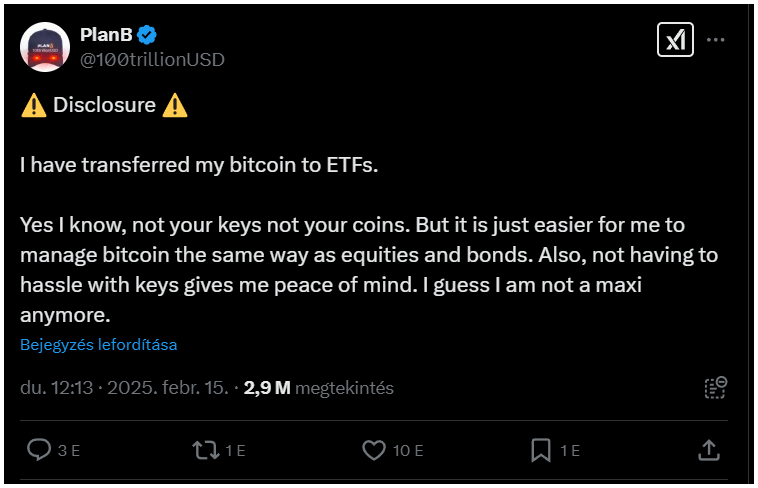Popular Bitcoin analyst PlanB just confessed he’s moved all his Bitcoin from his own personal custody into those shiny new spot Bitcoin ETFs.
This comes as a surprise to many, considering self-custody is often preached in the crypto community.
Stay ahead in the crypto world – follow us on X for the latest updates, insights, and trends!🚀
Not your keys, not your problem?
PlanB dropped the bomb on X, saying he wants to manage his Bitcoin like any other traditional asset, such as equities and bonds.

The reason? He just doesn’t want to deal with the keys anymore.
“I guess I am not a maxi anymore.”
Self-custody means you’re in charge of your own private keys, like holding the keys to your own digital kingdom.
This is what makes Bitcoin permissionless in the first place. This is the innovation from the traditional finance.
But with great power comes great responsibility. You have to protect those keys from hackers, thieves, and any other digital baddies lurking in the shadows.
Key oversight
And the crypto world isn’t exactly a safe haven. In 2024 alone, crypto heists have already snatched over $2.3 billion worth of assets in 165 separate incidents, marking a 40% jump from last year, according to Cyvers, an onchain security firm.
Lucas Kiely, chief investment officer at Yield App, pointed out that when it comes to returns, spot Bitcoin ETFs, futures ETFs, and just holding Bitcoin directly are all basically the same thing.
The main difference comes from management fees, and the possibility of a hostile government account freeze.
Matter of sovereignity, or matter of yield?
PlanB’s announcement sparked a bit of a debate among his 2 million followers on X. He even admitted he had no idea Bitcoin ETFs were such a hot-button topic.
He even wondered if buying MicroStrategy would be seen any differently than investing in a Bitcoin ETF.
Some users were quick to ask if this move would trigger a taxable event for PlanB. But fear not! PlanB clarified that since he’s a tax resident in the Netherlands, he doesn’t have to worry about capital gains tax when he sells.
Instead, they have a wealth tax, where the government assumes you make around 6% return on your total wealth each year and taxes you about 2% of your net worth annually.
That’s not about being a maxi or not…
It’s about the individual decision of having an asset in your control or not.
Do you trust yourself or do you trust someone else?
— Dan Held (@danheld) February 15, 2025


